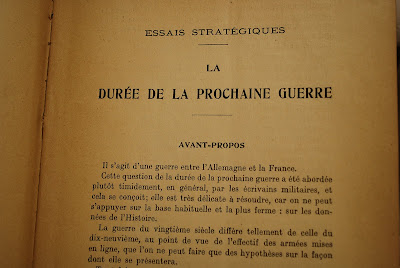

"Il s'agit d'une guerre entre l'Allemagne et la France" roughly translates as "This is a war between Germany and France"
This is another in our "outputting-ly accurate predictions about World War I" series. Published in 1912, two years before the outbreak of the Great War, it attempts to deduce the duration of the war and the factors that will affect it. The author makes clear at the beginning that what follows is opinion, and the chapters then survey the writings of military men, history, and rational analysis. The author conclude early on that Germany will fight a war allied with Austria against Russia, France, and England. They then review the manpower, materiel, munitions, finances, "morals", and political systems of each country to understand how important they might be in the coming conflict. It then reviews strategic considerations before making its conclusions. I'd comment on it, but instead I'll leave you with some choice translated quotes...
"[the war] between a united Germany and Austria will have to cope with Russia, France and England." (15)
"even after its best army is met with disaster, a nation that does not want to die has not lost." (18)
"One is forced to recognize that the coming war will not be limited to one big battle" (27)
It outlines that at some point the intensity of the war will totally undermine national economies, industry, and agriculture which will cause strong pressures on governments to end the war. "Will this critical moment come at the end of three, four, or five months?...we have no serious basis for knowing this" (31)
"We must fight the idea, within the populace, that the next war will be decided and will finish after the first large battle" (32)
"Final victory will certainly come to the people with the most tenacity" (32)
Prophetic stuff...












 click to enlarge
click to enlarge